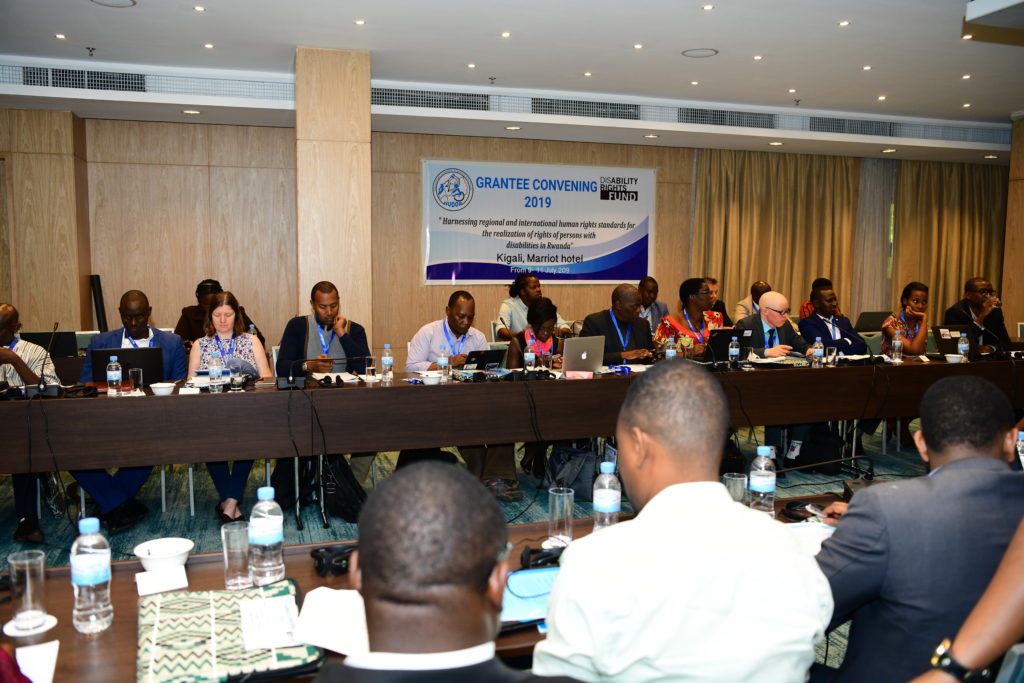Blog
Disability Rights Advocacy Fund Grantees in Rwanda Contribute to Government Review of National Disability Laws to Reduce Stigma and Discrimination
By Jorge Manhique and Milika Sakala
The Government of Rwanda ratified the UN Convention on the Rights of Persons with Disabilities (UNCRPD) and its Optional Protocol in 2008. Prior to ratification, the Rwandan Government developed a legal framework to protect and promote the rights of Persons with Disabilities (PWDs): Law No. 01/2007 on Protection of PWDs in General and Law No. 02/2007 on Protection of Disabled Former War Combatants. However, these laws are not fully aligned with the CRPD, and contain pejorative terms and a medical model of disability.
With support of the Disability Rights Advocacy Fund, which has been doing grantmaking in Rwanda since 2013, the disability movement has been monitoring CRPD implementation and advocating for needed legislative changes. As part of this, a coalition led by the National Union of Disability Organizations of Rwanda (NUDOR) drafted and submitted an Alternative Report on the implementation of the CRPD to the CRPD Committee in 2018. A delegation of representatives from Rwandan disabled persons organizations (DPOs) participated in the CRPD Committee review in September 2018 and March 2019.
Concluding Observations of the CRPD Committee, published in April, urged the government to adopt a legislative framework to combat multiple and intersectional discrimination, particularly as experienced by women and children with disabilities, and to develop a coordinated strategy for implementation. The CRPD Committee’s recommendation aligns with the commitment made by the government of Rwanda at the July 2018 U.K. Global Disability Summit. To fulfil this obligation, the government, with the support of the United Nations Development Program (UNDP), has tasked the Rwanda Law Reform Commission to lead a review of national laws. The review started in June 2019 and is estimated to be completed by end of year.
To ensure persons with disabilities and DPOs are participating in this process, NUDOR and its member organizations have developed a parallel review process to analyze the laws and identify provisions that are not aligned with the principles and rights outlined in the CRPD. To this end, a two-day workshop was held in June 2019 and a position paper was drafted for submission to the Rwanda Law Reform Commission.
Other DRF grantees are also contributing to the review. The Rwandan Organization of Women with Disabilities, UNABU, in partnership with one of their coalition members, Legal Aid Forum, conducted a study of laws and policies relating to access to justice from the perspective of women and girls with disabilities. Preliminary results were presented in June 2019, during the DRF Grantee Convening in Rwanda. The final report will be shared with the government.
The Rwandan Union of the Blind (RUB) conducted a desk review of the Inclusive and Special Education Policy to point to gaps that contribute to barriers experienced by learners with visual impairments in the education system. In addition, RUB undertook a stakeholder mapping in nine districts to identify and document learning programs and institutions that enroll and address learning needs of pupils/students with visual impairments as well as document what support services are available. RUB will also be sharing results with the government.
Also, in the education sector, the Organisation d’Integration et de Promotion des Persones Attenintes d’Albinisme (OIPPA), in consultation with stakeholders and communities, drafted a report on low-cost accommodations to overcome barriers children with albinism face in education. The report was written to ensure that the Ministry of Education and the Rwandan Education Board understand the situation of children with albinism and can chart a way forward in collaboration with all stakeholders.
So that exercise and recognition of legal capacity of the voice of persons with psychosocial disabilities and persons with intellectual disabilities will not be forgotten, Human Rights First Rwanda Association completed an Assessment of the Right to Equal Recognition before the Law, which was submitted to the CRPD Committee as part of the CRPD review process. They also shared this Assessment with the government, including the Rwanda Law Reform Commission.
Through adding the voices and perspectives of the people who are directly impacted by existing discriminatory laws and by providing evidence for necessary changes, all of these DRAF grantees are helping the Rwandan government to fulfil its global commitments and create a society where no one is left behind.
